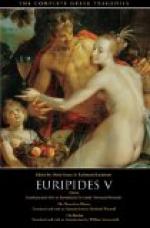I answer then. And, mother, this shall be
My prayer of opening, where hangs the whole:
Would God that He had made thee clean of soul!
Helen and thou—O, face and form were fair,
Meet for men’s praise; but sisters twain ye
were,
Both things of naught, a stain on Castor’s star,
And Helen slew her honour, borne afar
In wilful ravishment: but thou didst slay
The highest man of the world. And now wilt say
’Twas wrought in justice for thy child laid
low
At Aulis?... Ah, who knows thee as I know?
Thou, thou, who long ere aught of ill was done
Thy child, when Agamemnon scarce was gone,
Sate at the looking-glass, and tress by tress
Didst comb the twined gold in loneliness.
When any wife, her lord being far away.
Toils to be fair, O blot her out that day
As false within! What would she with a cheek
So bright in strange men’s eyes, unless she
seek
Some treason? None but I, thy child, could so
Watch thee in Hellas: none but I could know
Thy face of gladness when our enemies
Were strong, and the swift cloud upon thine eyes
If Troy seemed falling, all thy soul keen-set
Praying that he might come no more!... And yet
It was so easy to be true. A king
Was thine, not feebler, not in anything
Below Aegisthus; one whom Hellas chose
For chief beyond all kings. Aye, and God knows,
How sweet a name in Greece, after the sin
Thy sister wrought, lay in thy ways to win.
Ill deeds make fair ones shine, and turn thereto
Men’s eyes.—Enough: but say
he wronged thee; slew
By craft thy child:—what wrong had I done,
what
The babe Orestes? Why didst render not
Back unto us, the children of the dead,
Our father’s portion? Must thou heap thy
bed
With gold of murdered men, to buy to thee
Thy strange man’s arms? Justice! Why
is not he
Who cast Orestes out, cast out again?
Not slain for me whom doubly he hath slain,
In living death, more bitter than of old
My sister’s? Nay, when all the tale is
told
Of blood for blood, what murder shall we make,
I and Orestes, for our father’s sake?
CLYTEMNESTRA.
Aye, child; I know thy heart, from long ago.
Thou hast alway loved him best. ’Tis oft-time
so:
One is her father’s daughter, and one hot
To bear her mother’s part. I blame thee
not....
Yet think not I am happy, child; nor flown
With pride now, in the deeds my hand hath done....
[Seeing ELECTRA unsympathetic,
she checks herself.
But thou art all untended, comfortless
Of body and wild of raiment; and thy stress
Of travail scarce yet ended!... Woe is me!
’Tis all as I have willed it. Bitterly
I wrought against him, to the last blind deep
Of bitterness.... Woe’s me!
ELECTRA.
Fair days to weep,
When help is not! Or stay: though he lie
cold
Long since, there lives another of thy fold
Far off; there might be pity for thy son?




